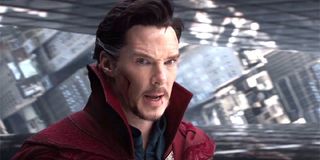Why There Isn’t A Lot More Of The Marvel Cinematic Universe In Doctor Strange

Doctor Strange is absolutely part of the larger Marvel Cinematic Universe, featuring a number of elements that tie back to other movies and characters, but overall very much exists as its own thing. Compared to, Captain America: Civil War, which built on all 12 of the films that preceded it in the franchise, Scott Derrickson's movie is much more focused on its titular hero's corner of the world, and as such doesn't make any time for big cameos or namedrops. Given the fun that comes with the interconnected-ness of the MCU, some fans may question why we didn't see more of it in the magic-fueled blockbuster - but the explanation is rather simple: there just wasn't space to fit it into the story that needed to be told.
The subject of Doctor Strange and its position within the Marvel Cinematic Universe was one of the topics I discussed with the film's co-writer, Jon Spaihts, during a recent interview in Burbank, California. I asked the screenwriter about balancing the known Marvel Cinematic Universe with all of the material introduced in Doctor Strange, and he explained that we don't see more direct MCU connections in the film as a result of the main origin story and the world of magic requiring a lot of screentime in order to make them effective within the narrative. Said Spaihts,
The story of Doctor Strange, the cosmic expanses to which he opens the Marvel Cinematic Universe in this movie, that takes up a lot of room. His story is a big story, and the adventure that he gets up to is a big adventure. There's not a lot of room for an intrusion or visitation from one of the other heroes just to shoot the breeze. Down the road, no doubt they'll cross paths more with other people, but there wasn't a lot of room for it.
In response to this, one could point out that the equally insular Ant-Man from last year was able to squeeze in a larger Marvel Cinematic Universe connection with a cameo from Anthony Mackie's Falcon -- but Doctor Strange is a legitimately different beast. Not only does the world of magic require a lot more explanation than the science in director Peyton Reed's 2015 movie, but the new blockbuster also happens to be mostly set far away from the rest of the established franchise -- featuring long sequences in places like Nepal and Hong Kong.
Obviously it was ultimately decided that it was fine for Doctor Strange to be more of its own thing without too many Marvel Cinematic Universe connections, this same topic led to another key conversation between Jon Spaihts and co-writers Scott Derrickson and C. Robert Cargill in the development of the blockbuster: how much the movie would actually "disturb" the world featured in many other franchises. Said Spaihts,
There was some consideration of how visible the disturbances in this film should be, the extraordinary things that happen to New York are carefully bracketed within a device that makes them invisible to people outside the conflict. That's a common argument in the world of comic books generally. Fans are saying, 'Well, if Daredevil is dealing with this thing, where is the Fantastic Four when this happened?' And frankly Doctor Strange in some of the larger epics has to be exiled to the North Pole or off-planet or something because he could have solved the problem!
The argument that Jon Spaihts mentions is one that comic book movie fans have been discussing for many years now -- specifically since The Avengers united on screen in 2012. The good news is that when the movie doesn't fully explain away a detail, there are always wonderful no prize explanations that fans can employ to at least have everything make sense to themselves.
Did you like that Doctor Strange mostly focused on its own portion of the Marvel Cinematic Universe, or do you hope that we will get to see more interaction between the titular hero and the comic book movie world as the franchise continues? Hit the comments with your thoughts, and be sure to stay tuned for more from my interview with Jon Spaihts!
CINEMABLEND NEWSLETTER
Your Daily Blend of Entertainment News

Eric Eisenberg is the Assistant Managing Editor at CinemaBlend. After graduating Boston University and earning a bachelor’s degree in journalism, he took a part-time job as a staff writer for CinemaBlend, and after six months was offered the opportunity to move to Los Angeles and take on a newly created West Coast Editor position. Over a decade later, he's continuing to advance his interests and expertise. In addition to conducting filmmaker interviews and contributing to the news and feature content of the site, Eric also oversees the Movie Reviews section, writes the the weekend box office report (published Sundays), and is the site's resident Stephen King expert. He has two King-related columns.
Most Popular




